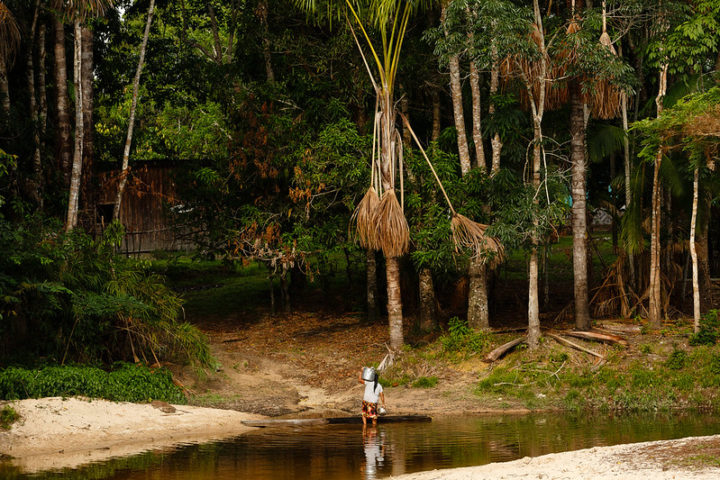2020 National Seminar — Forum on Climate Change and Social-Environmental Justice
Public letter
We, the participants of the 2020 National Seminar – Forum on Climate Change and Socio-Environmental Justice, gathered virtually from December 1st to 4th, 2020. We are representatives of the five regions of Brazil (North, Northeast, Midwest, Southeast, and South) and also the Amazon, Caatinga, Cerrado, Atlantic Forest, Pantanal, Pampa, and Coastal Zone biomes. Amid the bankruptcy and total collapse of the ongoing neo-liberal project, founded on the interests of capital, greed, and the destruction of our planetary heritage, we reaffirm our commitment to fight, aiming for the building of a broad, alternative, democratic, and widespread political project for our country.
We understand that the project we intend to build collectively must start from a broad reconnection with our cultural roots and our ancestral ways of life. The neoliberal development project that has been imposed upon our population does not serve us because it deals with death, which is ever closer to life on Earth. On our side, we reiterate our commitment towards the defense of defending all kinds of life that exist in our Mother Earth.
We shall state that we do not give up this collective building project in favor of life because we believe in a systemic vision of the Earth, as in the proposal of an Integral Human Development brought by Pope Francis. This proposal along with other perspectives, which inspire us, reinforces the certainty that climate change can only be contained with the systemic rupture of the capitalist ways of production and consumption.
There is a close relationship between fundamentalism, political, religious, environmental, cultural, racial, and climate emergency and socio-environmental damage. Therefore, climate change must be thought of in a way connected with anti-racist struggles, inter-generational relations, and gender equality. In this perspective, we reject policies that embrace the genocide of black and indigenous peoples, the destruction of our culture, and the frequent attacks on the Right to Information. We denounce the unacceptable aggressions to Brazilian citizenship and political repression, as is the case of the recent “Influencers Map,” produced by BR+ Comunicação. The Ministry of Economy has spent R$2.7 million on this roster that has been used to map and track journalists and opinion-makers, whom they call “detractors of bolsonarism.” There we have another example of unacceptable methods of persecution and restriction of freedom.
Responses to climate change and environmental racism should arise from popular and anti-capitalist alternatives. It is impossible to expect a response from those who rely on an anthropocentric individualist logic that imposes the human being’s vision as the central focus of reality, always competing for the incessant pursuit of profits, human exploitation, and Common Goods. These days in the seminar gave us a rich and diverse variety of good practices of confronting climate changes, inspired by the Good Live philosophy, based on the wisdom of ancestry and the historical strategies of resistance of the peoples of the waters and forests, to change this reality towards a new harmonic coexistence with the Earth and all living beings.
Among these experiences, we highlight:
- the engagement for agrarian reform
- the practice of agroecology, urban agriculture, food security and sovereignty, free of pesticides and transgenics
- coping with the megaprojects of death brought by the current development model
- vegan, vegetarian, or drastically reduced animal protein diets
- the recognition and appreciation of the knowledge and ways of life of traditional peoples and communities; and,
- the transition to renewable, lower impact, fair, and popular types of energy sources.
Now we should have a look at megaprojects linked with the so-called development, such as mining, the steel industry, nuclear power plants, wind and solar farms, and hydro and agribusiness. They are the main entities responsible for environmental degradation, violation of rights, and greenhouse gas emissions. We strongly believe that the engagements against developing and implementing these devastating projects in the territories are fundamental. It is noteworthy that the main entity responsible for CO2 emissions is the burning of fossil fuels. We also emphasize that the megaprojects’ logic alone is devastating. The alternative energy sources only make sense if they could be built following popular standards, with comprehensive respect for the territories.
In this sense, among the engagement strategies to fight this, we also highlight:
- national and international legal denouncements against corporations and political representatives responsible for the damages caused by climate change
- advocacy for the rights of nature
- joint efforts in the struggle against those megaprojects; and,
- experiences of Caatinga remaking and combating desertification that affects all biomes in Brazil.
Raising as one voice from the Forum National Climate Change and Socio-Environmental Justice participants, we reassert our commitment to articulate, engage and fight, inform and train, and denouncing any practice that worsens wealth accumulation, racism, machismo, social inequality, and aggressions to the rights of Mother Earth.
Brazil, December 4, 2020
The 70 members and partners of the Forum on Climate Change and Social-Environmental Justice
Link to our partner’s original file
Translation by José Luiz Corrêa from the voluntary Pressenza translation team. We are looking for volunteers!






